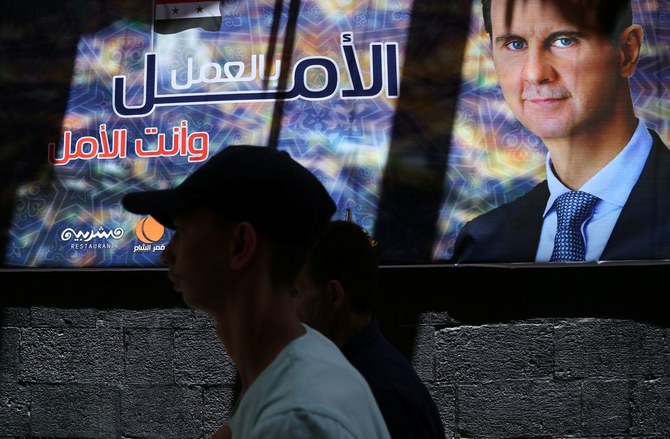LONDON: Syria is using shell companies to bypass sanctions imposed by the West, a report by the Guardian has revealed.
The paper claims documents it has obtained show three companies — Trappist, Generous and Super Brandy, which were all set up on the same day in October last year — have links to President Bashar Assad and his allies, including individuals sanctioned by the US, EU and UK.
The trio are majority-owned by regime figures through “an intricate web of connections,” the Guardian said, including part ownership of third party companies, in order to indirectly control other entities and trade in shares.
Individuals involved include Yasar Hussein Ibrahim, head of the economic and financial office of the Syrian presidency and an adviser to Assad, and businessman Nasser Deeb Deeb, both of whom are under sanctions by the US.
The pair exercise control through part ownership of other companies in partnership with other businessmen and women, which have interests in the shell companies. Ibrahim, for instance, is a part owner of telecoms company Wafa JSC, which is also part owned by another firm called Tele Space, whose owner, Ali Najib Ibrahim, is a co-owner of the three shell companies.
Another sanctioned individual linked with indirect control of a shell company is Khodr Ali Taher, who has been sanctioned by the UK and EU for his connections to the regime, and has also been accused of playing a role in the smuggling and sale of amphetamines.
The system allows the regime to stay a step ahead of countries and blocs who have imposed sanctions, propping up areas of the economy and frustrating efforts to further punish the government in Damascus for its repeated human rights abuses.
The US government passed the so-called Caesar Acts in 2020, which allowed it to target regime affiliates with sanctions, but so far has not used them against any individual or company.
Meanwhile, the UK has only imposed one new set of sanctions on regime figures since officially leaving the EU the same year.
Muhammad Samer Al-Khalil, the Syrian economy minister, said in October 2021 that evading sanctions had “become a Syrian craft.”
Eyad Hamid, a senior researcher at the Syrian Legal Development Program, told the Guardian: “It is important (to continue to track shell companies) as it is part of the asset freeze and drying-up of resources the regime is using to violate human rights in Syria.
“The (Biden) administration’s sanctions have been very limited and, in a way, they do not have the appetite that was in the previous administration to impose sanctions on individuals in Syria.”
Justine Walker, head of global sanctions at the Association of Certified Anti-Money Laundering Specialists, told the Guardian: “Part of (sanctions) is to ensure a company doesn’t continue operations and isn’t able to set up (in the first place).”
She added that more needed to be done to ensure the practice was tackled, preventing the regime from circumventing the international community.
“If you can imagine how many companies are set up in Syria, it’s outside the bandwidth of governments, so investigation specialists and due-diligence providers play a crucial role.”
Hamid agreed, saying: “There needs to be more investment, investigations and on-the-ground sources to keep up with these changes in the Syrian business scene because it’s not a stable environment; it keeps shifting.”






















